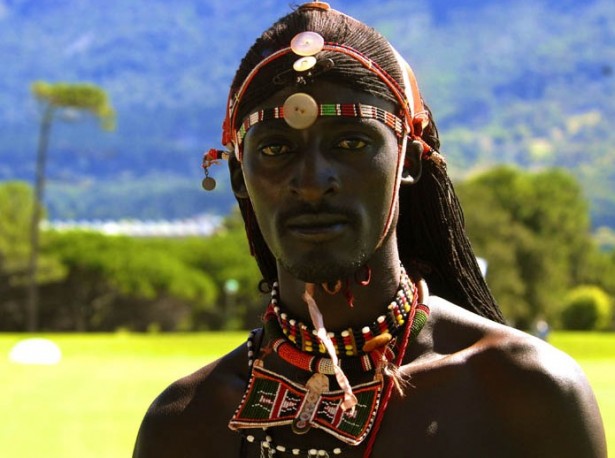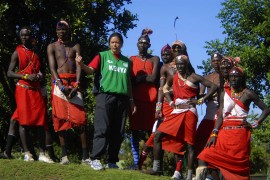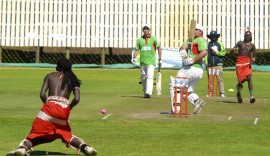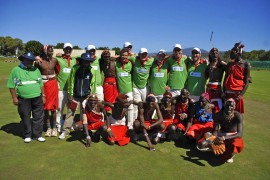
A team of Masai warriors from Kenya swapped their spears for cricket bats and their shields for shin guards the first week in April to participate in the Last Man Stands cricket tournament in Cape Town, South Africa.
The Masai warriors cut striking figures as they played the game in their red traditional garments, complete with headgear and decorative jewelry. Their only concessions to the standard white cricket uniform were the shin guards, and in a bid to gain traction on the pitch, their sandals were replaced with modest sporting footwear.
The weeklong amateur cricket tournament was the first semiprofessional tournament at which the warriors tested their recently acquired batting and bowling skills.
However, while the tournament may have presented a new opportunity and experience for the humble warriors, it was the journey to Cape Town that presented a litany of “firsts” for each warrior who made the long trip from the remote Laikipia region in Kenya to the southern tip of Africa.
It was the first time the warriors had traveled outside of their village using a train. Then it was on to an airplane for another first, and when that plane touched down in South Africa, it represented yet another first on the warriors checklist—first time they’d set foot in another country. Twenty-nine-year-old Mulinge Francis Ole Meshame explains: “It was my first time stepping into a plane. I thought maybe you could feel movement, but it was comfortable. When it was landing you could feel something.” He adds quickly that he and his teammates were not afraid. “We are warriors. We have no fear.”
Meshame has been playing cricket for the past five years and insists the game is not so different to the way of the Masai. “We Masai are used to throwing spears, and that’s just like throwing the ball. This game uses the same equipment that the Masai use.”

The Masai in a friendly photo with one of their opponents, the Kriekedille team (Nawaal Deane)
The game was introduced to the warriors by South African conservationist Aliya Bauer. A trained cricket coach, Bauer says that transforming herself from a conservationist to a cricket coach of Masai warriors has been an “interesting journey.” She has been living with the community for close to a decade, and when she arrived, her job focused on conservation and, in particular, to understand and resolve the conflict between primates and humans in the area in which the Masai live.
It was through her work that Bauer crept into the hearts of the Masai community.
But she found that it was difficult to engage with the children and, specifically, the girls of the Masai community. Bauer points to patriarchy as a contributing factor in their shyness to communicate with her, a foreigner. “So I asked the local chief for permission to teach the children cricket,” she says. “It would be very wrong for me to bring in a totally foreign concept like cricket into the community and not ask permission.”
Soon thereafter, she was teaching cricket to the children of the community in a bid to draw them out and communicate with her. The children’s enthusiasm for the game piqued an interest in other community members and before long the warriors traded their spears for cricket bats and balls in friendly games with one another.
Interest in cricket spread to other Masai communities in the region, and now the game is being used as a peaceful alternative to

(Nawaal Deane)
warring tribal conflict on sporting platforms such as the Laikipia Highlands Games, in which the tribes of the region engage in athletics, including soccer and other events. The not-for-profit Cricket Without Boundaries (CWB) has also sent some support to the Masai cricket team, which has limited resources. The CWB also recently awarded the Masai warriors with official coaching diplomas.
But the warriors are not just playing the game for its own sake. They are using it as a powerful and effective way to promote the idea of conservation, to eradicate female genital mutilation (a Masai custom), to promote HIV/AIDS awareness, and to highlight the dangers of alcohol abuse. “Alcohol abuse among the youth is a big problem, who are also affected by HIV,” Meshame explains. “We recruit the youth into cricket, because if they are idle they get into trouble.”
Team captain Nissan Jonathan Ole Meshami says that slowly but surely attitudes in the community about female genital mutilation are changing. As a result of their campaign against the practice, a new rite of passage practice has emerged in which a young girl is blessed by the elders and goes through a ceremony marking the transition from girl to woman.
Meshami, who has completed high school, says the girls and women of the community can write and that many of the Masai have had schooling. He says that while there are modern influences on the Masai lifestyle the traditions are still held dear, and

Aliya Bauer (center), coach (and inspiration) for the Masai Cricket Warriors (Nawaal Deane)
despite playing cricket there are some things, such as the Masai attire, that they would not change for the tournament: “We are a kind of a spectacle. The rules of the game said we must wear a white shirt; but we didn’t, and this means we are respected. At the beginning of the game we always sing a traditional song, and that has not been eroded.”
Meshami says the “cricketeers” would be expected to give a full report of their travels to the community upon their return to the village. “There are so many things I should tell them. Like this, we don’t have good fields like this,” he says, pointing at the perfectly tended lawns of the pitch in Cape Town.
Putting aside the allure of perfectly rolled lawns, the Masai community appears to be successfully navigating modernity and its influence on their culture. “There’s a lot of change,” Meshame explains. “People go to school. They start changing their mode of dress. We want children to go to school, but we don’t want them to lose our culture. We still find young girls married to old men and we are using cricket to spread the message against this practice. If the good things of our culture are kept, then we will survive; but if we keep the bad things, then that will change.”
Meshame says that when the warriors play in their traditional attire their messages are amplified: “We have to tell them the pros and cons of these things. If you cut down trees, then it can’t rain; and if the water table goes down, then there is no water for our cattle.
“The elders thought cricket was a children’s game, but when they understood the messages we are spreading, they came around. They are definitely proud of us.”
© 1998 - 2012 Indian Country Today. All Rights Reserved To subscribe or visit go to: http://www.indiancountry.com